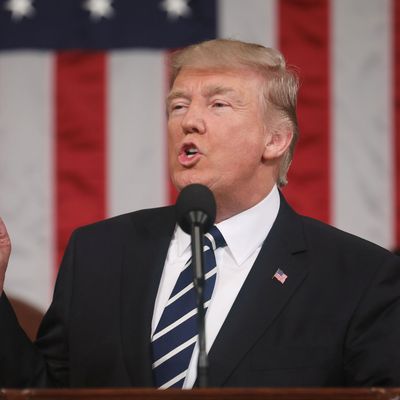
A casual listener to President Trump’s speech to Congress might have the impression of a president who has endorsed a mix of raw nationalism and popular bipartisan goals. Repeatedly, Trump implored Democrats to join together to pass his agenda. (“On this and so many other things, Democrats and Republicans should get together and unite for the good of our country, and for the good of the American people.”) It takes some slight familiarity with the details to recognize how hollow his offer is, and how unlikely Democrats are to take it up.
Trump promised “massive tax relief for the middle class.” In fact, his tax proposal overwhelmingly benefits the rich, and the plan being designed by his allies in Congress benefits the rich exclusively. He proposed subsidies for “private, charter, magnet, [or] religious” schools. There is Democratic support for public school choice, and evidence to support its effectiveness, but the private school vouchers Trump insists on subsidizing are a dismal failure. There’s no bipartisan support for an ideological crusade to divert resources to sectarian institutions. Trump proposed a plan “to make child care accessible,” but that plan is a giveaway to the rich and does not help families that need help the most.
He dismissed Obamacare as a “disaster,” while asking Democrats to help fix it. If he believes a law that has given 20 million Americans access to medical care, come in well under budget, and seen the lowest levels of medical inflation on record is a “disaster” — as opposed to a law that needs small improvements — there is no common basis from which to proceed. And Trump’s suggested principles for replacement offer too little detail for any evaluation. His promise to invest in “clean air and water” is a sick joke, given his decision to hand environmental enforcement over to polluters and to slash the budget for regulation.
Trump repeatedly invoked the possibilities of a massive infrastructure boom. But, in a rare outbreak of specificity, he made clear his proposal would do no such thing. Trump urged Congress to pass “legislation that produces a $1 trillion investment in the infrastructure of the United States — financed through both public and private capital.” That means, rather than direct spending, he remains wedded to a scheme of tax breaks for builders, which would merely confer windfall benefits on existing firms and yield few new projects, and those that are built would have little public utility.
On the whole, Trump’s agenda shows a president who has not departed from the plutocratic agenda that has dominated his party for a quarter-century, but only added grotesque, cruel, racist, and deeply stupid selling points. He has nothing to offer a party not enamored of the opportunity to carry out a massive and historic upward redistribution of wealth.






























